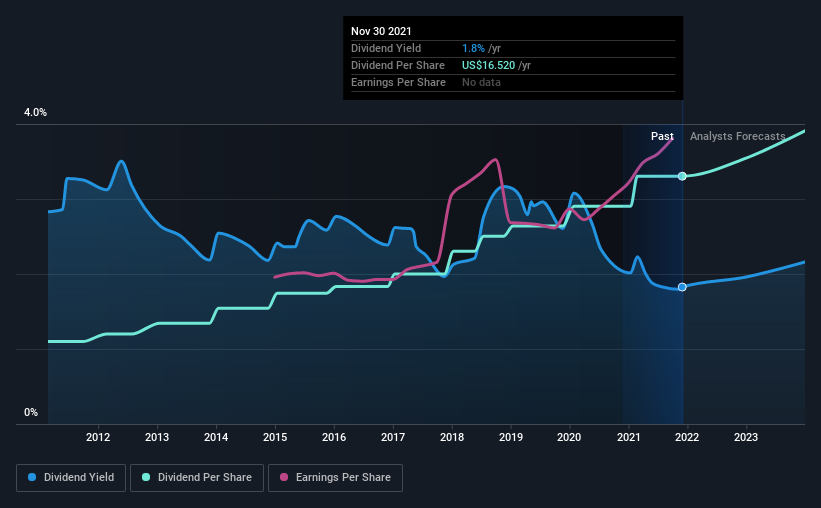BlackRock, Inc. (NYSE:BLK) Looks Like A Good Stock, And It's Going Ex-Dividend Soon
Some investors rely on dividends for growing their wealth, and if you're one of those dividend sleuths, you might be intrigued to know that BlackRock, Inc. (NYSE:BLK) is about to go ex-dividend in just four days. The ex-dividend date is one business day before the record date, which is the cut-off date for shareholders to be present on the company's books to be eligible for a dividend payment. The ex-dividend date is an important date to be aware of as any purchase of the stock made on or after this date might mean a late settlement that doesn't show on the record date. Therefore, if you purchase BlackRock's shares on or after the 6th of December, you won't be eligible to receive the dividend, when it is paid on the 23rd of December.
The company's upcoming dividend is US$4.13 a share, following on from the last 12 months, when the company distributed a total of US$16.52 per share to shareholders. Last year's total dividend payments show that BlackRock has a trailing yield of 1.8% on the current share price of $904.61. Dividends are an important source of income to many shareholders, but the health of the business is crucial to maintaining those dividends. We need to see whether the dividend is covered by earnings and if it's growing.
View our latest analysis for BlackRock
Dividends are typically paid out of company income, so if a company pays out more than it earned, its dividend is usually at a higher risk of being cut. That's why it's good to see BlackRock paying out a modest 42% of its earnings.
Generally speaking, the lower a company's payout ratios, the more resilient its dividend usually is.
Click here to see the company's payout ratio, plus analyst estimates of its future dividends.
Have Earnings And Dividends Been Growing?
Stocks in companies that generate sustainable earnings growth often make the best dividend prospects, as it is easier to lift the dividend when earnings are rising. If earnings fall far enough, the company could be forced to cut its dividend. Fortunately for readers, BlackRock's earnings per share have been growing at 14% a year for the past five years.
Many investors will assess a company's dividend performance by evaluating how much the dividend payments have changed over time. Since the start of our data, 10 years ago, BlackRock has lifted its dividend by approximately 12% a year on average. It's exciting to see that both earnings and dividends per share have grown rapidly over the past few years.
The Bottom Line
From a dividend perspective, should investors buy or avoid BlackRock? Typically, companies that are growing rapidly and paying out a low fraction of earnings are keeping the profits for reinvestment in the business. Perhaps even more importantly - this can sometimes signal management is focused on the long term future of the business. In summary, BlackRock appears to have some promise as a dividend stock, and we'd suggest taking a closer look at it.
While it's tempting to invest in BlackRock for the dividends alone, you should always be mindful of the risks involved. For example - BlackRock has 1 warning sign we think you should be aware of.
If you're in the market for dividend stocks, we recommend checking our list of top dividend stocks with a greater than 2% yield and an upcoming dividend.
Have feedback on this article? Concerned about the content? Get in touch with us directly. Alternatively, email editorial-team (at) simplywallst.com.
This article by Simply Wall St is general in nature. We provide commentary based on historical data and analyst forecasts only using an unbiased methodology and our articles are not intended to be financial advice. It does not constitute a recommendation to buy or sell any stock, and does not take account of your objectives, or your financial situation. We aim to bring you long-term focused analysis driven by fundamental data. Note that our analysis may not factor in the latest price-sensitive company announcements or qualitative material. Simply Wall St has no position in any stocks mentioned.

